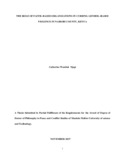Please use this identifier to cite or link to this item:
http://ir-library.mmust.ac.ke:8080/xmlui/handle/123456789/263Full metadata record
| DC Field | Value | Language |
|---|---|---|
| dc.contributor.author | Njagi, Catherine Wambui | - |
| dc.date.accessioned | 2017-11-20T12:29:50Z | - |
| dc.date.available | 2017-11-20T12:29:50Z | - |
| dc.date.issued | 2017-11 | - |
| dc.identifier.uri | http://r-library.mmust.ac.ke/123456789/263 | - |
| dc.description.abstract | Faith-based organizations are defined as faith-influenced non-governmental organizations. They are often structured around development and/or relief service delivery programs and are sometimes run simultaneously at the national, regional and international levels. Faith-Based organizations have played an important part in effective global responses to gender--based violence over the past twenty years and have a central role to play in the development and implementation of gender--based violence retention programs. An increasing amount of research highlights the health burdens, generational effects, and demographic consequences of Genderbased violence. Gender-based violence occurs across all socio-economic and cultural backgrounds. In Kenya, women are socialized to accept, tolerate, and even rationalize gender-- based violence and to remain silent about such experiences. The consequences of gender--based violence include death, HIV/AIDS, unwanted pregnancies, physical and psychological trauma. Most of the literature on Faith-based organizations initiatives towards Gender-based Violence response is scarce and primarily addresses what Faith-based organizations are against rather than their efforts in combating gender-based violence. There is very little evidence to show how the potential of Faith-based organizations have been or can still be tapped in curbing Gender-based violence. It is against this background that this study examines their role in combating genderbased violence as well as care and support for the survivors. The specific objectives of the study were:- to examine the nature and status of gender based violence in Nairobi County, Kenya, to analyse the role of faith--based organizations in curbing gender--based Violence in Nairobi County and to explore the challenges faced by faith--based organizations in combating gender-- based Violence. The conceptual framework that guided the study comprised of Reasoned Action Theory and Gender Schema Theory. These theories argue that people’s behavior, attitude and practices can change for better if influenced in the right way. Faith-based organizations fall in this category of change agents within the society or at an individual level and become very relevant in addressing Gender-based violence reduction measures. The study was based on exploratory and descriptive research design. The data was collected using interviews, semi structured questionnaires consisting of both open and closed ended questions and focus group discussions. The sample size of the research was two hundred and fifty (250) respondents from members of the four Faith-based organizations namely Muslim Advocacy Network against Domestic Violence, Fellowship of Christian Councils and Churches in the Great Lakes and Horn of Africa, Amani Communities Africa, Circle of Concerned African Women Theologians, public administration officials and survivors of gender- based violence. The data was analysed through Statistical packages for social science. The study found out that all types of Gender-based violence exist in Nairobi County. It also found that Faith-based organizations have a great potential not only in the prevention of Gender-based violence but also in providing care and support to people living with trauma associated with gender-based violence. The study recommends that more research to be done in other counties across the country to assess the effect of Gender-based violence for comparison and observation of the trends in gender-based Violence. The findings of the study will contribute to existing knowledge on how to curb Gender-based violence. The research findings further provide a foundation for more discussions and actions on matters related to Gender-based violence among the academic settings, policy makers, community leaders and Kenyans in general. | en_US |
| dc.description.sponsorship | School of Disaster Management and Humanitarian Assistance | en_US |
| dc.publisher | MMUST | en_US |
| dc.subject | Faith-based organizations | en_US |
| dc.subject | non-governmental organizations | en_US |
| dc.subject | gender--based violence | en_US |
| dc.subject | Nairobi County | en_US |
| dc.title | THE ROLE OF FAITH--BASED ORGANIZATIONS IN CURBING GENDER--BASED VIOLENCE IN NAIROBI COUNTY, KENYA | en_US |
| Appears in Collections: | School of Disaster Management and Humanitarian Assistance | |
Files in This Item:
| File | Description | Size | Format | |
|---|---|---|---|---|
| THE ROLE OF FAITH--BASED ORGANIZATIONS IN CURBING GENDER--BASED VIOLENCE IN NAIROBI COUNTY, KENYA.pdf | 3.37 MB | Adobe PDF |  View/Open |
Items in DSpace are protected by copyright, with all rights reserved, unless otherwise indicated.
